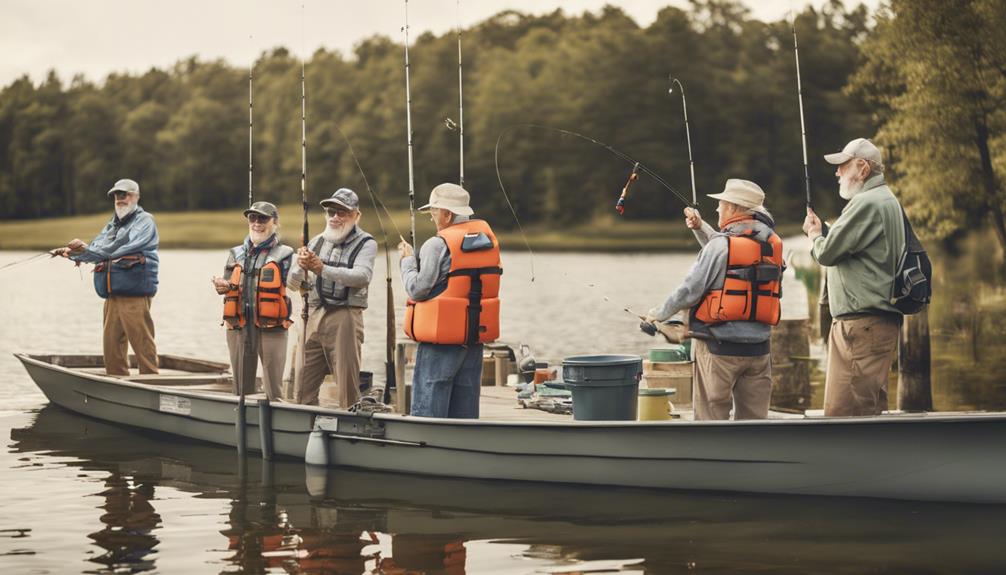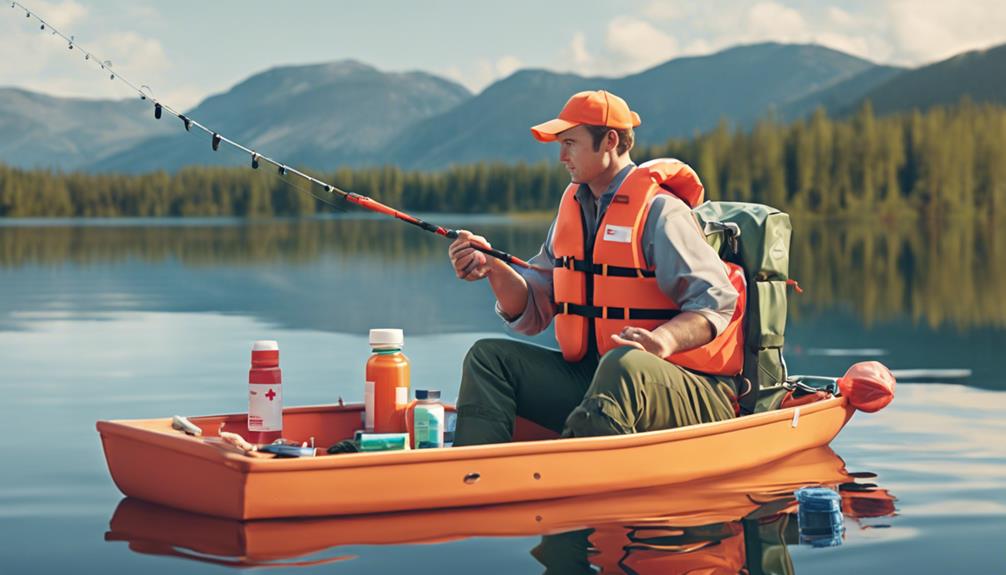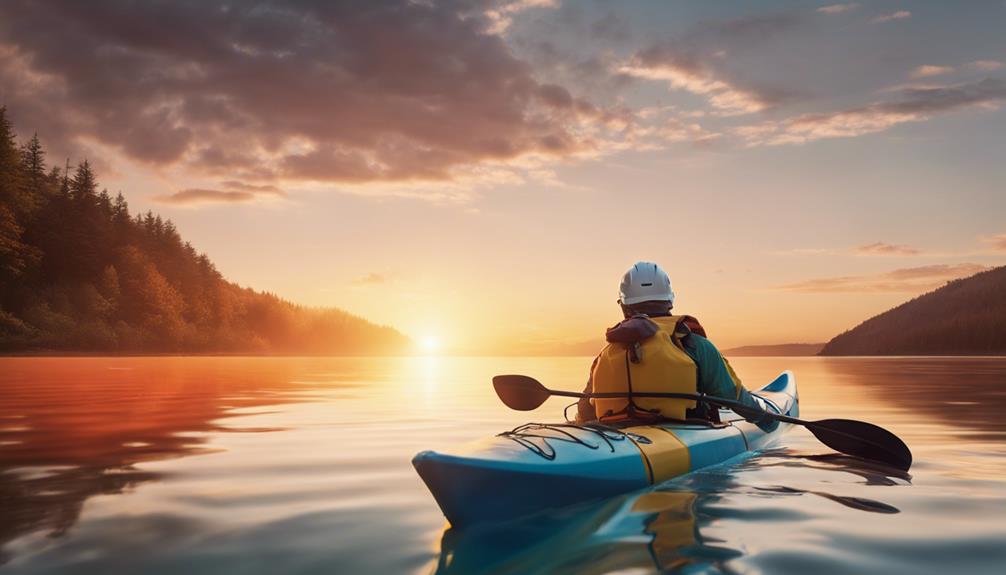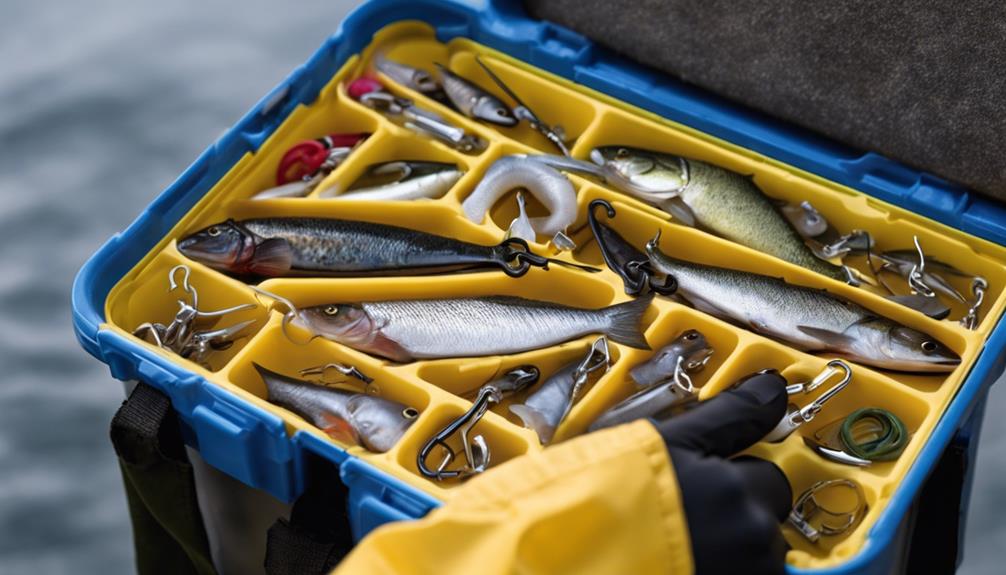Have you ever wondered if your fishing gear can truly keep you safe while out on the water?
From the right equipment to understanding weather patterns and water conditions, ensuring your safety as a senior angler involves a combination of preparation and caution.
But what are some effective ways to navigate these elements and enjoy a worry-free fishing experience?
Let's explore some key strategies that can help you stay safe and secure during your angling adventures.
Importance of Proper Gear
To ensure your safety while fishing, using the appropriate gear is crucial. When it comes to gear maintenance, always check your equipment before heading out. Inspect your fishing rods for any signs of damage, such as cracks or fraying lines. Make sure your reels are functioning smoothly and that the drag system is working correctly. Proper gear maintenance not only ensures your safety but also improves your overall fishing experience.
Equipment selection is another vital aspect of fishing safety. Choose gear that's suitable for the type of fishing you plan to do. Different types of fish require different equipment, so make sure you have the right tools for the job. Consider factors such as the strength of the fishing line, the weight capacity of your rod, and the type of bait or lures you'll be using. By selecting the appropriate equipment, you not only increase your chances of a successful fishing trip but also reduce the risk of accidents or malfunctions.
Weather Awareness Tips
Keeping an eye on the weather forecast will be essential for ensuring your safety while fishing. Before heading out, check for any storm warnings or advisories in your area. If severe weather is predicted, it's crucial to take storm precautions to stay safe. Make sure you have a plan in place for seeking shelter if needed and that your gear is properly secured to prevent damage.
Maintaining your fishing gear is also important in varying weather conditions. Extreme temperatures or moisture can affect the performance of your equipment. Regularly inspect your gear for any signs of wear and tear, and address any issues promptly to avoid accidents or malfunctions while out on the water.
Having a fishing buddy can greatly enhance safety during unpredictable weather. Establish a communication plan with your fishing partner so that you can quickly coordinate actions if the weather takes a turn for the worse. It's always safer to fish with a companion who can assist in case of emergencies or adverse weather conditions.
Understanding Water Conditions
Being aware of water conditions is crucial for your safety while fishing. Here are three essential tips to help you understand water conditions better:
- Currents analysis: Before heading out to fish, take some time to analyze the currents in the area where you plan to fish. Strong currents can be dangerous, especially for senior anglers. Look for signs of fast-moving water, such as debris floating swiftly or ripples on the surface. Avoid fishing in areas with unpredictable and strong currents to prevent accidents.
- Temperature checks: Water temperature can impact not only the behavior of fish but also your comfort and safety. Make sure to check the water temperature before you start fishing. Sudden changes in water temperature can indicate potential weather changes or underwater activities that might affect your fishing experience. Additionally, being aware of the water temperature can help you dress appropriately for the conditions, preventing any discomfort or health issues.
- Observe water clarity: The clarity of the water can affect your fishing success. Murky water might indicate recent heavy rainfall or other factors that could impact fishing conditions. Clear water allows you to see potential hazards under the surface and can also give you insights into fish behavior. Understanding water clarity can help you choose the right bait and techniques for a successful fishing trip.
Physical Preparation Before Fishing
Proper physical preparation is key to ensuring a safe and enjoyable fishing experience. Before heading out, take the time to do some stretching exercises to warm up your muscles. Focus on your arms, shoulders, and back as these are the areas most commonly used while fishing. Simple stretches like arm circles, shoulder rolls, and side bends can help prevent strains and injuries while casting or reeling in fish.
Hydration is crucial for a successful fishing trip, especially for seniors. Make sure to drink plenty of water before, during, and after your time on the water. Dehydration can lead to fatigue, cramps, and dizziness, which can all affect your fishing performance and safety. Consider bringing a reusable water bottle with you and take regular sips to stay hydrated throughout the day.
In addition to stretching and staying hydrated, it's essential to listen to your body. If you start feeling tired or experience any discomfort, take a break and rest. Pushing yourself beyond your limits can lead to accidents or health issues. By taking care of your body through stretching exercises, staying hydrated, and knowing when to rest, you'll be better equipped to enjoy a safe and successful fishing outing.
Safety Measures While Casting
To ensure safety while casting, always be mindful of your surroundings and those nearby. Proper casting techniques and line management are crucial to prevent accidents and injuries. Here are three essential safety measures to consider:
- Master Your Casting Techniques: Before casting, make sure you have enough space around you. Properly execute your casting motion, keeping the rod tip in control to avoid hitting yourself or others. A smooth, controlled cast not only improves accuracy but also reduces the risk of accidents.
- Manage Your Line: Pay close attention to your fishing line. Avoid sudden jerks or tangles in the line that could lead to mishaps. Maintain a firm grip on the line during casting to prevent it from getting tangled or causing unintended harm. Proper line management is key to a safe and enjoyable fishing experience.
- Be Aware of Those Around You: Always be mindful of other anglers, bystanders, or wildlife in the vicinity. Communicate with fellow anglers to ensure everyone is a safe distance apart. By being aware of your surroundings and considering the safety of others, you can prevent potential accidents while casting.
Handling Fish Properly
When handling fish after a successful catch, prioritize safety by following proper techniques to prevent harm to yourself and the fish. Fish handling etiquette is crucial for both your safety and the well-being of the fish. Avoid handling fish with dry hands as it can damage their protective mucous layer. Wet your hands before touching the fish to prevent removing this layer, which helps them fight off infections and parasites. Additionally, avoid squeezing the fish too tightly, as this can cause internal injuries.
Fish release plays a significant role in conservation and sustainability efforts. If you're practicing catch-and-release, handle the fish gently and swiftly. Keep the fish in the water as much as possible and only lift it for a quick photo before releasing it back into the water. Avoid dropping the fish onto hard surfaces and support its body properly when holding it. This ensures the fish can swim away strongly after being released. Remember, proper fish handling techniques not only protect the well-being of the fish but also contribute to maintaining healthy fish populations for future generations to enjoy.
Importance of Communication Devices
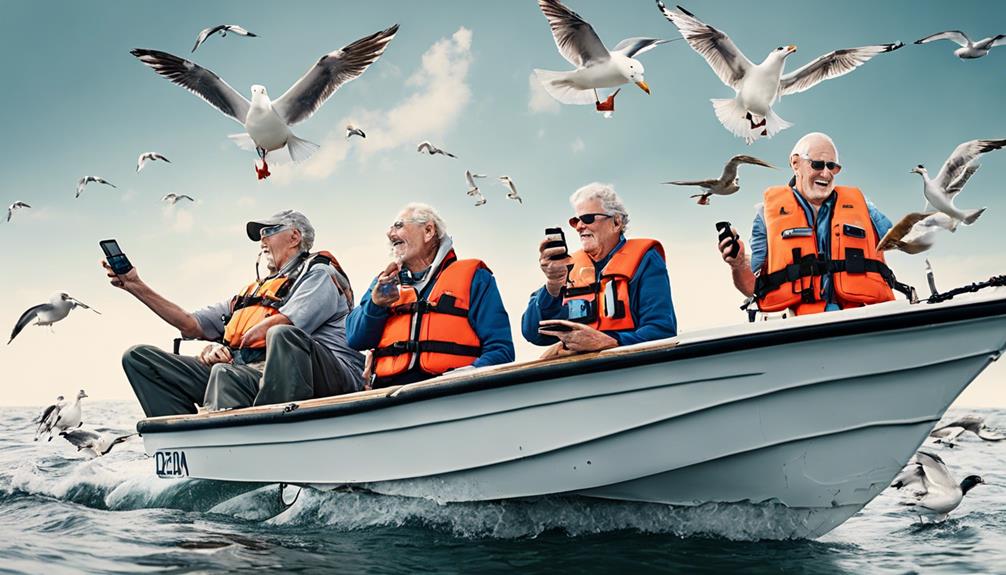
Using communication devices while fishing is essential for ensuring your safety and staying connected in case of emergencies. When out on the water, having the right tools can make a significant difference in your overall fishing experience. Here are three key aspects to consider when it comes to the importance of communication devices:
- Signal Devices: Carrying signal devices such as whistles or air horns can help you attract attention if you find yourself in a challenging situation. These items are small, easy to carry, and can be lifesaving in emergencies when visibility is limited.
- Emergency Contact: Make sure to have a reliable form of communication with emergency contacts on land. This could be a cell phone with a waterproof case, a two-way radio, or a personal locator beacon. Being able to reach out for help quickly can ensure that assistance arrives promptly if needed.
- GPS Devices: Utilizing GPS devices can aid in navigation and help rescuers locate you more easily in case of an emergency. Whether it's a handheld GPS unit or a smartwatch with GPS capabilities, having this technology at your disposal can provide added peace of mind while out fishing.
Knowing Emergency Procedures
In case of an emergency while fishing, knowing the proper procedures to follow can be crucial for ensuring your safety and the safety of those with you. First and foremost, familiarize yourself with basic first aid techniques. Being able to administer first aid for common fishing-related injuries like hook wounds, cuts, or minor burns can make a significant difference in the outcome of an emergency situation. Carry a compact first aid kit in your fishing gear so you can quickly address any injuries that may occur.
Another essential aspect of knowing emergency procedures is having a list of emergency contacts readily available. Make sure to have a list of important contacts such as family members, friends, or emergency services saved in your phone or written down in a waterproof container. In the event of an emergency, you can quickly reach out for help and provide necessary information to the responders.
Additionally, familiarize yourself with the specific emergency procedures of the fishing location you're visiting. Different areas may have unique protocols for handling emergencies, so understanding these in advance can help you act swiftly and effectively when faced with a crisis. By being prepared and informed about first aid techniques, emergency contacts, and location-specific procedures, you can enhance your safety and that of your fishing companions.
Frequently Asked Questions
Are There Any Specific Fishing Techniques That Seniors Should Avoid to Prevent Injury?
When you're fishing, it's important to consider safety. Certain casting techniques can help prevent injuries. Avoid using too much force when casting, as it can strain your muscles and joints.
Additionally, be cautious with your fishing gear to prevent accidents. By being mindful of your casting techniques and handling your gear carefully, you can enjoy fishing while reducing the risk of injury.
How Can Seniors Stay Hydrated and Maintain Energy Levels While Fishing for Long Periods of Time?
To keep your energy up and stay hydrated during long fishing sessions, pack plenty of water or sports drinks. Snack on energy-boosting foods like nuts and fruits. Wear comfortable, breathable clothing and use gear that reduces strain on your body.
Take breaks in the shade to rest and rehydrate. These simple steps will help you enjoy fishing without feeling drained or dehydrated.
What Are Some Common Fishing-Related Injuries That Seniors Should Be Aware of and How Can They Prevent Them?
When fishing, seniors should watch out for common injuries like hook accidents and slips. Stay safe by properly handling gear, wearing sturdy footwear, and maintaining balance.
To prevent injuries, be mindful of your surroundings, avoid overexertion, and take breaks.
Proper hydration and sun protection are essential for a comfortable and safe fishing experience. Stay aware, move carefully, and enjoy your time on the water while prioritizing safety.
Is There a Recommended Maximum Duration for a Fishing Trip for Seniors to Ensure Their Safety?
For seniors, setting an optimal duration for a fishing trip is crucial for safety. Consider your physical limitations and plan accordingly. Safety precautions should be taken into account, along with equipment considerations.
Keep your fishing trip within a reasonable timeframe to prevent exhaustion or strain. By being mindful of the recommended maximum duration, you can ensure a safe and enjoyable fishing experience.
Are There Any Specific Fishing Spots or Locations That Are Safer for Seniors to Fish at Compared to Others?
When fishing as a senior, consider fishing spots with easy access and calm waters to ensure your safety. Check the fishing equipment for sturdiness and reliability before heading out.
Be mindful of weather conditions to avoid unexpected challenges while on the water. By choosing safer locations and being prepared with suitable gear, you can enjoy a more secure and pleasant fishing experience.
Conclusion
In conclusion, for senior anglers, ensuring fishing safety is crucial for an enjoyable experience. By having the proper gear, staying aware of weather conditions, understanding water conditions, physically preparing, taking safety measures while casting, handling fish properly, having communication devices, and knowing emergency procedures, you can fish safely and confidently.
Remember, safety should always be a top priority when enjoying your time on the water. Stay safe and happy fishing!
